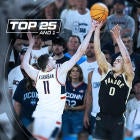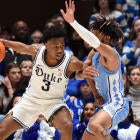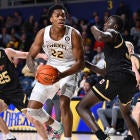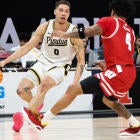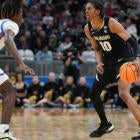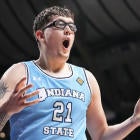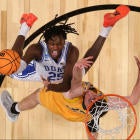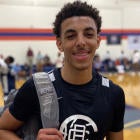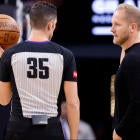TUCSON, Ariz. -- The sounds thumped a mother's soul with the resonance of a two-ton kick drum.
Janel Nnaji could not believe what she was hearing come from downstairs. Zeke? Is that really you?
She'd just returned home after a weeklong work trip and was unpacking as her only son, years from entering middle school, sat at the family's baby grand piano.
"I dropped what I was doing," Janel said. "I was shocked."
Little Zeke Nnaji had played keys for a few years, but the level of detail of this new piece of music was atypically difficult for someone in elementary school. At such a young age Zeke was more than "good at piano." He was truly a player. He clearly had, and still has, that relatively rare ability to connect with one of the world's most demanding, versatile and popular musical instruments.
Little Zeke is no longer little. Nnaji is approximately 6-foot-11 and 240 pounds and has become a top-three freshman in college basketball while starring for Arizona. He's encroaching on top-five-all-time status in a number of Wildcat freshman categories. His 16.6 points per game are fifth-best by an Arizona freshman in school history. His 61.5% 2-point clip only trails Deandre Ayton (63.5%). He has 12 double-doubles, second-most by a frosh in Arizona history, only behind Ayton's 24. (Ayton was really, really good.)
As Arizona homes in on a return to the NCAA Tournament, a high-potential team has seen Nnaji emerge as the best and most consistent player over the past three months. For as talented as he is on hardwood, his most undeniable natural gift arrives on the ivories. Many college and pro athletes have musical ability, but Nnaji borders on virtuoso. He's played since he was 6 -- even before that if you count the toy piano he'd bang on in post-toddlerhood.
By the age of 8 Nnaji had to upgrade piano teachers, coming home with assignments well beyond what most his age could handle. Within one or two weeks of putting new sheet music on the piano rack -- classical or otherwise -- he'd master just about any composition.
"He'd say, 'Mom, what key do you want me to play it in?'" Janel said. "Dude, you're eight years old! What key do you want me to play it in? He outgrew his piano teacher by the end of middle school. She could teach him no more."
About a decade after he first wowed his parents and teachers, Nnaji would play the national anthem at Arizona to more than 14,000 people.
"I'd never done something at that scale before, and the whole time I was thinking, Don't mess up, don't mess up," Nnaji said. "But as soon as I got out there, I didn't even think. It went by so fast. … All I could see was the keys and nothing else."
Nnaji's musical prowess was inevitable. Janel learned piano from her mother and grandmother. She played trombone in jazz band and was a member of the University of Minnesota's marching band.
"My piano teacher used to think I was really good, until she met my son," she said.
Zeke's father, Apham, grew up in Enugu, Nigeria, and sang/toured in a band while in college, back when disco, funk and soul music was most prominent in his part of the world.
"Singing has been incredible for me, and unbeknownst to me, when I met my wife, she also came from a musical family, so one of the first things we did was buy a piano -- and the rest is history," Apham Nnaji said. "Before basketball took over our lives, we'd be downstairs jamming. Karaoke, every kind of music you can think of."
Apham's CD collection is huge, and so Nnaji and his two younger sisters, Maya and Josie, grew up listening to Sam Cooke, Jelly Roll Morton, Dolly Parton, ABBA, Don Williams, Stevie Wonder, Kansas, Boston, Bach, Leo Sayer, Bob Marley and tons of roots reggae. Before games, Nnaji listens to the Jackson Five. "Sir Duke" is maybe his favorite Stevie song. Among his favorite pieces to play are George Fischoff's "Georgia Porcupine," Carl Philipp Emanuel Bach's "Solfeggietto in C minor," and the instantly recognizable "Für Elise" by Beethoven.
"I give credit to my parents," Nnaji said. "They put all this great music around me."
Nnaji was a rapidly growing dichotomy from grade school up into high school. In addition to basketball, Zeke played soccer and football, the latter of which he quit when he got too tall. Baseball was boring; Nnaji was annoyed how long it took between his at-bats. He learned guitar, sax, trumpet and drums. He played in jazz band. His parents did not permit exposure to video games, and he was only allowed to have a cellphone in high school because of the number of Division I coaches who requested contact with Nnaji, who would go onto become a top-40 prospect.
"He was always engaged and I wanted him to be a kid like I was, not worrying about technologies and desensitizing kids to unnecessary exposure that I don't think that helps them to be children," his father said.
Piano remained his love, more than any other hobby or sport. When he plays, he becomes a different version of himself. That's because playing music has an unearthly ability to pull you out of yourself, or burrow and fold you in, all depending on mood, music and environment.
"Let go and absorb myself in the music, I don't even really think, I just go off instinct," Nnaji said. "Any chance I could get, I was always on it."
Piano practice provided parallels to playing basketball. Nnaji is someone who must see results from a process without much delay. Put in the work on a song, riff, chorus or coda -- be it for 30 minutes for six straight hours -- and that diligence will show itself if you don't cut corners. The doing is exposed in real time. In hoops, it's not that easy. But learning music -- embracing repetition, facing up to the hard parts -- made him a better athlete and bred unabating competitiveness.
"When you work hard and don't see results, it discourages -- it makes you not want to work hard," Nnaji said. "But working hard at piano and seeing so many different results of me being able to play this really difficult song that I hadn't been able to before, seeing things like that, how it translated to basketball, working hard, seeing results in my shot. In the weight room, too. Lifting hard, finally seeing results. Piano really helped start off the hard-work process and helped me to appreciate it."
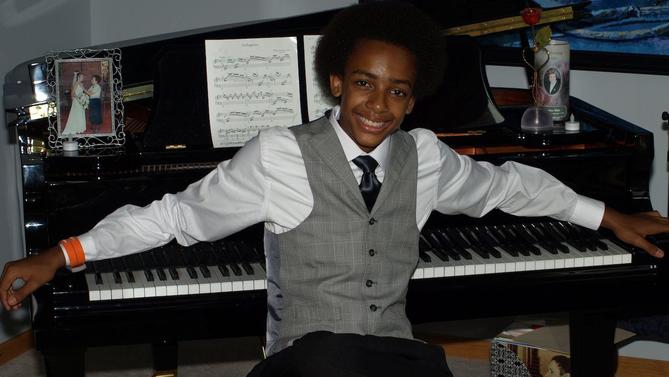
Arizona coach Sean Miller called Nnaji a perfectionist (pianists sometimes are, given the nature of their instrument). When the notion of Nnaji playing the national anthem was up for real consideration, his only plan was to practice incessantly -- basketball and keys, back and forth. He'd lope over to the music building and work in those cramped practice rooms. The day before his performance, presented with a different keyboard, he rehearsed on Arizona's court, with the sound system, five, six, maybe seven times.
"Usually a perfectionist has the advantages of being a curious learner, wants to be great, repetition, puts in the extra work," Miller told me. "But on the other hand, there's an innate competitiveness and physicalness that sometimes other great athletes have. I don't see a lot of guys who have both. In Zeke's case, he does."
In high school, when Nnaji was on an unofficial visit to UCLA, they brought out a keyboard for him to play around Bruins players. A couple of people took videos. Within minutes, he was handed a phone: Bruce Hornsby was on the line.
"Hey, Zeke, this is wonderful," Hornsby said. "If you commit to UCLA, I'm going to make a record with you."
Exciting as that was for Nnaji, Arizona won out, and now Nnaji's gone from big man with potential to bona fide first-round-draft-pick material. Earlier this month, Janel and Apham flew out to visit their son and catch a couple of games. When he'd hop in the car, he'd pull up a specific song to play back through bluetooth.
"I would go have dinner with Zeke in the evening," she said. "Most guys are going to turn on Drake or something like that. He had already Googled, 'What is the most difficult song ever to play on piano?'"
This is what they listened to.
That is what Nnaji has been playing along to on his TV as of late. It's the third movement of Beethoven's Moonlight Sonata. It's an outrageously difficult piece of music. Really good piano players might need months to master it.
"I've only just started and I don't really have a lot of time to work on it, but I think if I was given a month I would definitely have it done," Nnaji said.
Arizona is 18-7 overall and in a four-way tie for first place in the loss column in the Pac-12. To understand part of why that is, watch that Beethoven video. Nnaji has been, unquestionably, the team's best player. His discipline, determination and optimism are consistently in tune. Killer on the keys, killer on the court.
As SoCon hopes for two-bid year, coaches sound off
On Tuesday, Ken Pomeroy published a piece that highlighted the peculiar punishment that's befallen Stephen F. Austin. In short, Pomeroy asks why the 22-3 Lumberjacks are nowhere near the bubble discussion, then presents a convincing argument why that should end immediately.
Pomeroy's point also applies in part to three pretty good SoCon teams in a similarly unenviable spot: East Tennessee State, Furman and UNC Greensboro are a combined 66-15 with an 11-11 mark vs. Quad 1 and Quad 2 opponents. ETSU and Furman have nine road wins, UNCG has eight. ETSU is 42nd in the NET, UNCG is 55th, Furman is 72nd.
None are viewed as a viable bubble team just yet. ETSU has a shot, but it probably has to win its huge home game against Furman on Wednesday night. (Furman already has a win against ETSU.) Meantime, Wes Miller's UNCG team -- which maybe should have made the 2019 NCAA Tournament -- has a win over Furman, those two meeting again next Wednesday. A season ago, I lobbied for a two-bid SoCon, and if things break the right away again, the committee should be treating at least the top two teams from this league with the same consideration they could afford SFA.
Unfortunately, SoCon's margin for error is uncomfortably small; all three are left to cannibalize each other at the expense of the league.
"The reality is you are looking at three teams that have combined for 66 wins and it's only Feb. 18," Furman coach Bob Richey told CBS Sports. "Winning a game against any of these three teams on the road are Quad 1 wins. Obviously we don't get the amount of opportunities as power-conference teams to accumulate the amount of Quad 1 and 2 wins. I know this: There isn't one power league team that has signed up to play at our place. There are some flaws within the analytics because from a budgetary standpoint, all three teams have to use our 'guarantee' money on non-Division Is. These games don't get factored into the analytics and give us an efficiency bump like when a power league team plays a low-major opponent and wins by 30."
It also doesn't help -- in fact, it's a negative -- that a game like Furman-ETSU isn't on over-the-air television, or even a mainstream streaming platform.
ETSU coach Steve Forbes has a 123-43 record in nearly five seasons there. He's won at least 24 games -- and at least 13 league games -- every season he's been there. He's been to the NCAA Tournament once. This season's team rates as his best, but ETSU might have room for one -- and only one -- more loss before it's out of the at-large conversation.
"I feel a ton of pressure each time we step on the court because I know that any loss could and would be devastating to our NCAA Tournament profile," Forbes said. "A year ago the league was very top heavy with four teams winning 24 games or more. This year, the league is deeper. ... I've been in the league for five years, and each year the league has gotten better and better from top to bottom."
Last season SoCon champ Wofford received a No. 7 seed and came within a bucket or two of beating Kentucky to make the Sweet 16. The conference is formidable. The trick comes in measuring how good top SoCon squad are vs. other bubblers. ETSU is 39th in Wins Above Bubble, which is five spots above SFA. If a two-bid SoCon is going to happen, then two of these three teams need to combine for one loss total. But that's not how it should be.
"We potentially have six teams in our league who could win 20 or more games," Richey said. "Not too many, if any, mid-major conferences in America can say that."
@ me
Have a Q, curiosity or complaint? Then @ me early and often on Twitter.
@Aztec_MBB Has an impressive record but other then that, what makes them special? What am I missing? @GaryParrishCBS @MattNorlander
— 247 tobacco rd (@247tobaccoroad) February 16, 2020
The undefeated mark alone makes them special, for one. They also have one of the 10 most impressive players in college basketball, Malachi Flynn, who is still not getting enough for credit. Flynn is averaging 16.7 points, 5.1 assists, 4.7 rebounds, 1.9 steals and shooting 38% from 3-point range. What's more, SDSU has been this good despite not having starting center Nathan Mensah the past 14 games. Top-10 in offensive and defensive efficiency and one of the dozen-or-so best 3-point shooting teams in the sport. There's plenty more, but that's a start.
@GaryParrishCBS @MattNorlander if Beilein is no longer coaching the Cavs, where is his likely destination? Could he realistically go to UT?
— Joshua Freerks (@PettingLlamaBoy) February 17, 2020
By UT, Joshua of course means Texas. At this stage, no one really knows. If you're Texas, do you pursue John Beilein and hope you can have him for, what, six or seven years? He's 67 years old. If he wants to coach in college again he's going to get a job. There is no "most likely" yet and with the carousel not expected to be too nuts this March, Beilein's options will not be plentiful -- if he wants to return to college basketball. Boston College and Wake Forest should pursue heavily.
@MattNorlander is Woldo the player that makes UVA a legitimate dark horse second weekend team? Coming off wrist surgery, he was the missing piece
— bananaslugpab (@bananaslugpab) February 16, 2020
Wahoos junior Tomas Woldetensae has played a higher percentage of minutes this season than Jay Huff, which I in no way anticipated. His 114 3-point attempts are by far the most of any Cavalier and his 38.6% clip from beyond the arc is the best of all Tony Bennett's players. He's a necessity, and I think it's fair to say Virginia is a true dark horse second-weekend team at this stage given the lack of confidence in the offense. Not even a surefire tournament team yet, though.
Final shots
- Congrats are in order to Xavier Tillman, happily married and now a father of two after he welcomed in a son early Monday morning. Tillman is expected to play Thursday in Michigan State's road game against Nebraska, but if he didn't that would of course be completely fine.
- Rutgers fans, Jerry Palm says your lack of wins away from home could prevent you from making the NCAA Tournament.
- Creighton's stability is overlooked. The 21-6 Bluejays have 20 wins for the 20th time in 22 years. And with Tuesday night's win at Marquette, are a Big East dark horse no more.
- UConn freshman forward Akok Akok "suffered a complete rupture of his left Achilles tendon," according to the school. Akok can be an elite defender in college if he's able to recover to his former capacity. The question will be the timeline and if he's able to be back for UConn in time for the start of the 2020-21 season.
- Maryland's Jalen Smith has nine straight double-doubles, the longest active streak in the nation and the longest streak that coincides with a nine-game winning streak since 2002-03.
- San Diego State is hitting a glass ceiling, still at No. 4 in the AP Top 25. The last time a Mountain West team was as high as No. 3 was 2011, when Jimmer Fredettte-led BYU got there. Coincidentally, BYU is ranked this week (23) for the first time since 2011.
- The features folks at CBS went out and talked to a bunch of people who know Obi Toppin, plus the man himself, to tell the condensed story of where he was and how he got to be one of the best in the sport. Dayton beat VCU on Tuesday night, keeping its hopes for a No. 1 seed still alive.













